Contents
[New Version of Language Grid Agreement Released]
![]()
[New Language Resources]
![]()
[Open Service Grid Initiative Launched]
![]()
[Service Grid Open Source Project Community Site Now Open]
![]()
[M3 Introduced to Rakuwakai Otowa Hospital]
![]()
[Monthly Maintenance for July and August]
![]()
[Language Grid Users] IT University of Copenhagen
![]()
New Version of Language Grid Agreement Released
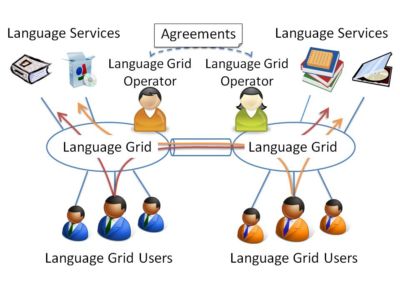
- New agreement for federated operation of Language Grid released
Federated operation is a means by which different Language Grid operators connect their Language Grids and operate them jointly. This enables Language Grid users to share and employ language services managed by their operators. In this summer, Kyoto University and NECTEC in Thailand will start federated operation.
The new agreement also expands users' rights.
- Expand usage purposes
Allow not only non-profit use, but also research use of language services on the condition that providers permit research use of their own services.
- Relax restrictions on type of control adopted for an application system
Allow not only "Under Client Control," where application system providers can identify application system users or control the terminals, but also "Under Server Control," where providers can control application system servers. In the case of "Under Server Control," the application systems can use only language services permitted by service providers.
Please refer to the Agreement page in Open Service Grid Initiative site for details.
- FAQ about new agreement
Q.Are the provided resources and services automatically available to users?
Provided resources and services can be accessed by users under the same Language Grid if the scope of service users is not expressly indicated by the service providers. Users under a different Language Grid can access them if they are expressly licensed by the providers. Service providers can also set access limits to users under a different Language Grid.
Q.Can corporate research laboratories use the Language Grid?
Corporate research laboratories can use language services on the Language Grid if they do not directly lead to commercial profit; but they are limited to using services allowed by the service providers.
Q.Can we compose language services across different Language Grids?
The users can compose language services provided by different Language Grids. Moreover, language services on a different Language Grid can also be listed on the Language Grid Service Manager.
Q.Do we have to modify the existing application systems?
Users do not have to modify their application systems. The application systems can invoke language services within the previous users' rights, without modification. If users want to use them within the expanded users' rights, they must modify their application systems.
- Current status of transition to new agreement
Transition to the new agreement began this April and 73% (88 of 120) of the users who concluded the former agreement have already signed it. If you have not done so yet, please sign the new agreement.
New Language Resource
A Vietnamese morphological analyzer has been registered.
This resource can separate Vietnamese sentences into sets of morphemes and analyze the morphemes' parts of speech.
Open Service Grid Initiative Launched
The Open Service Grid Initiative aims at connecting various types of Service Grids operated by different organizations, and building an Open Service Grid infrastructure through federated operation among different organizations across domains. As an example of Open Service Grid, Kyoto University and NECTEC in Thailand plan federated operation of the Language Grid in the language service domain.
Service Grid is expected to be applied in many different domains in the future, such as Agricultural Service Grid for providing agricultural knowledge and field information sensors, Education Service Grid for sharing education contents and e-learning systems, and so on.
Service Grid Open Source Project Community Site Now Open
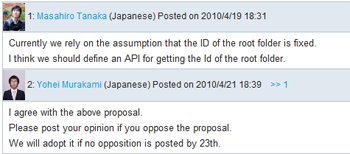
The Community Site for the Service Grid Open Source Project is now open. The site currently features packages and a range of information for Service Grid Server software, Language Services for Language Grid, and the Language Grid Toolbox.
Anyone can join the community site and post requests and questions on the multilingual BBS. Posting of requests and discussion among community members will help improve the software.
You can also directly contribute to development by posting code. We welcome your active participation and contributions.
M3 introduced to Rakuwakai Otowa Hospital
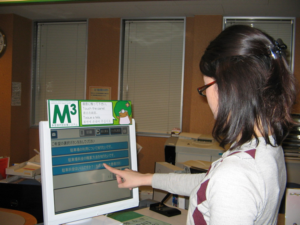
M3, developed by Associate Professor Takashi Yoshino and doctoral student Mai Miyabe at Yoshino Laboratory in Wakayama University, and Aguri Shigeno and Kana Maeda at the Center for Multicultural Society Kyoto was installed at Rakuwakai Otowa Hospital at the end of March 2010.
M3 uses language services on the Language Grid to support foreign patients.
Monthly Maintenance for July and August
The next maintenance of the Language Grid will be conducted on the Mondays of July 5 and August 2, at 18:00-21:00 JST. If you wish to use the Language Grid during this period, please contact us in advance at operation [at] langrid.org.
Language Grid Users: IT University of Copenhagen
J-Oresund - Intercultural Collaboration Project -At the IT University of Copenhagen in Denmark, the Global Interaction Research Initiative (GIRI) is constituted by a set of interdisciplinary research projects. As a GIRI member, J-Oresund supports a multilingual local community using the Language Grid.
Oresund is the name of a strait between the South Skane area of Sweden and Copenhagen. Since the Oresund Bridge opened in 2000, interaction between the two countries has been more strongly promoted. Exchanges between Japan-related associations of the two countries are also active since interest in Japan in this area is also growing year by year. Such exchanges between Japan and Sweden and Denmark, however, remain at a low level because of the language barrier.
J-Oresund offers a system in which Japanese people answer questions about Japan from Swedish and Danish people, which helps support the community.
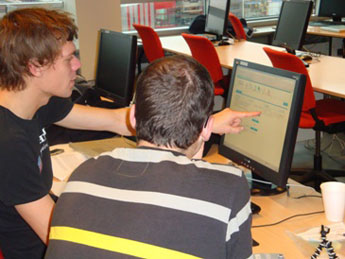
Using Language Grid Toolbox |
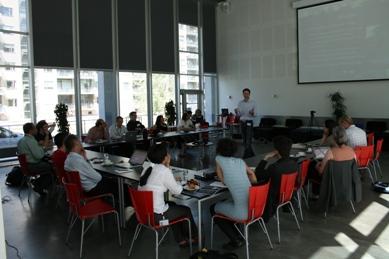
GIRI meeting |
